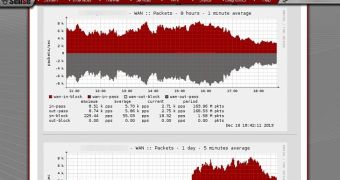PfSense 2.1.4, a free, open source customized distribution of FreeBSD tailored for use as a firewall and router, has been released and is now available for download.
PfSense is actually a free network firewall distribution based on the FreeBSD, but it uses a custom kernel and some pretty interesting applications. The developers make important changes from time to time, even if it's just an update in the same branch.
The developers of PfSense are also saying that their distro has been successful in replacing a number of commercial firewalls such as Check Point, Cisco PIX, Cisco ASA, Juniper, Sonicwall, Netgear, Watchguard, Astar, and others.
“pfSense software includes a web interface for the configuration of all included components. Unlike some similar GNU/Linux-based firewall distributions, there is no need for any UNIX knowledge, no need to use the command line for anything, and no need to ever manually edit any rule sets.”
“In fact, the majority of pfSense users have never installed or used a stock FreeBSD system. Users familiar with commercial firewalls catch on to the web interface quickly, though there can be a learning curve for users not familiar with commercial-grade firewalls,” said the developers on their website.
PfSense 2.1.4 comes with lots of changes and improvements. For example, a patch has been implemented for a Captive Portal pipeno leaking issue that lead to the “Maximum login reached” on Captive Portal, a text that was not relevant to Allowed IPs on the Captive Portal has been removed, a column for the internal port has been added on the UPnP status page, listening on the interface is now the preferred method, highlighting selected rules is now working properly, guiconfig has been added to widgets that didn't include it, and a variable typo has been fixed.
Also, /etc/version_kernel and /etc/version_base no longer exist, php_uname now has to be used to get the version for XMLRPC check, all IP Aliases are now deleted when an interface is disabled, the RRD archive rename is now handled properly during and upgrade, the ssl:// protocol is converted to https:// when PfSense is creating HTTP headers for XMLRPC, curl is now used instead of fetch to download update files, some protection has been added to parameters that come through _GET in service management, and already disabled user cannot expire.
More details about this distribution are available in the official announcement. You can download PfSense 2.1.4 right now from the official website.

 14 DAY TRIAL //
14 DAY TRIAL //